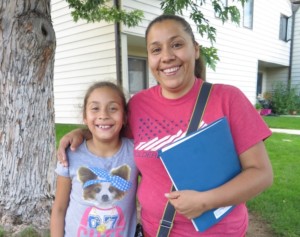EdNavigator: Supporting Families Through Education Wayfinding

You don’t have to look far today to find people talking about how we can help students “navigate a complex professional landscape” or “build a path to the future they deserve.”
Speaking as a person who has already made a number of adjustments in my career trajectory to get where I am, I have to agree that the topic of “career readiness” seems incomplete without, to use NGLC’s term, “Wayfinding Abilities.”
But there’s another side of this coin that is often overlooked. If a student does not have a mentor or caregiver that helps to guide them or support the development of their wayfinding skills, they will be less likely to find the opportunities they need to create upward momentum. For many students, socioeconomic status can be yet another barrier to accessing guidance opportunities; this dynamic can lead to a challengingly cyclical situation.
One of the many reasons Getting Smart believes access to quality guidance is one of the most important challenges to equity in our education system today is that not all students have access to the type of guidance needed to find opportunities for advancement.
EdNavigator, a New Orleans-based nonprofit, has developed an interesting and exciting strategy for tackling this challenge by providing families and caregivers with free navigational assistance. I recently spoke with Whitney Henderson, “Navigator-in-Chief,” about their approach.
Why Focus on Families?
To start, it’s important to understand the significant challenges facing caregivers who work in fields like the service industry. For example, small details like a student’s uniform being slightly off in a “zero-tolerance” charter can either cause these parents to miss work or, more likely, cause students to miss school. An additional challenge is finding high-quality school options, particularly if the caregiver doesn’t speak English as their first language. “There are so many charters in New Orleans,” says Henderson. “There’s one for every type of child–STEM, CTE, or even cooking.”
EdNavigator, Henderson says, started by asking, “How can we meet parents where they are?” This purposefully echoes ideas ever-present in personalized learning discussions, and it’s exciting to see the idea penetrating all aspects of a students educational experience. “We’re really focused on knowing the community landscape and helping not just students, but also families, with that. Think ‘educational concierge.’”
EdNavigator Founding Partner Tim Daly said, “We founded EdNavigator because we believe that education is the path to a better life. But navigating schools and education systems isn’t easy. The stakes are high, and there are so many questions, deadlines, and decisions along the way. That’s why we’re here—so you don’t have to do it all alone.”
The details of their work show that personalization and meeting caregivers and their students where they are is a serious commitment for their organization.
Personalized and Localized Learning (About Education)
When EdNavigator begins serving a new family, they assign a personal “Navigator” to get to know the family and student. Together, the parent and Navigator file a request with the school for student records (exams, discipline, reports cards, etc.), and analyzes those records in tandem with ongoing conversations with the family. “Reviewing this information enables us to ensure that the family knows about their student’s education, to see that they have resources available, and to build a story about each child’s development,” Henderson says. Occasionally, they will even make home visits.
This relationship-building is crucial, as Navigators may find themselves in situations where they have to give difficult news to caregivers. EdNavigator holds “calibration meetings” to be sure this type of information or news is relayed in a supportive and informative setting and they are able to summarize the analysis of their FERPA findings for the caregiver.
After this calibration meeting, Navigators begin the process of working with the family to identify community resources and educational opportunities suited to the student’s interests and family’s resources. This is particularly valuable for parents whose first language isn’t English–in New Orleans, for example, a school guide exists, but it’s not translated into other languages. Even if it was, says Henderson, “it wouldn’t translate like having a human being explaining it.” IEPs are also often not translated for Spanish-speaking families.
Other groups EdNavigator has identified as needing support are those caregivers supporting students wrapped up in the prison pipeline, and students with disabilities. 30% of EdNavigator’s students are special needs, because there are few supports/resources in New Orleans. It’s not hard to imagine that busy caregivers of students who have bbeen involved in the prison pipeline would need help finding out-of-school educational resources to help keep them productively occupied.
This service is 100% free for families–an intentional funding decision made by EdNavigator, which is where things get even more interesting.
Private-Sector Partnerships Funding Family Learning
Since a child’s interaction with their school is one of the main reasons people miss work, families who are better equipped and more knowledgeable about their child’s status in school (and whose students who are receiving the education they need) are less likely to miss work. EdNavigator provides its services to employers at a “per-family” rate to fund its work, thus giving employers a way to reduce turn-over and build morale. This set-up has been compelling enough for a wide range of (primarily hospitality-industry) employers in New Orleans to sponsor the program for their employees, and they have even expanded to new cities.
They are currently working with 1500 families in New Orleans, and their recent expansion into Boston has added 105 (and growing) to that count.
“We partner with socially-conscious employers who care about creating meaningful opportunities,” says Henderson.
They are taking the same general approach in Boston, where their first partner is Hebrew SeniorLife, one of the largest non-profit senior care organizations in New England.
They are considering next steps for building to greater scale, but want to ensure they maintain their commitment to personalization and quality in the areas they already serve (the requisite landscape knowledge and partnership-building behind their work pose challenges for scaling). A network-based approach may help in this area, when the time comes.
Closing Thoughts
EdNavigator is an inspiring example of creative partnership-building for social good, and a valuable new approach to improving social mobility among socioeconomically disadvantaged families. They offer employers an innovative way to improve their business’s performance and cut costs, all while improving educational outcomes for students and helping families, schools, and communities thrive. Most importantly, they are enabling the students who need strong educational environments and experiences the most to seek them out.
For more, see:
- Creating a Culture of Collaborative Family Engagement
- Meeting Students on Their Own Cultural Turf
- Education Systems Should Be Based on How Students Develop
Stay in-the-know with all things edtech and innovations in learning by signing up to receive our weekly newsletter, Smart Update.






0 Comments
Leave a Comment
Your email address will not be published. All fields are required.